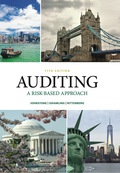
EBK AUDITING: A RISK BASED-APPROACH
11th Edition
ISBN: 9781337670203
Author: RITTENBERG
Publisher: YUZU
expand_more
expand_more
format_list_bulleted
Question
Chapter 1, Problem 33RQSC
To determine
Concept Introduction:
Professional Skepticism−In the course of making professional judgment, the auditor has to exercise professional skepticism. Professional skepticism means having a questioning mind and critically assessing the available audit evidences.
To explain:The importance of the professional skepticism and steps taken by skeptical auditor.
Expert Solution & Answer
Want to see the full answer?
Check out a sample textbook solution
Students have asked these similar questions
I need help with this general accounting question using standard accounting techniques.
Can you help me solve this general accounting problem with the correct methodology?
I am trying to find the accurate solution to this general accounting problem with appropriate explanations.
Chapter 1 Solutions
EBK AUDITING: A RISK BASED-APPROACH
Ch. 1 - Prob. 1CYBKCh. 1 - Prob. 2CYBKCh. 1 - Prob. 3CYBKCh. 1 - Prob. 4CYBKCh. 1 - Prob. 5CYBKCh. 1 - Prob. 6CYBKCh. 1 - Prob. 7CYBKCh. 1 - Prob. 8CYBKCh. 1 - Prob. 9CYBKCh. 1 - Prob. 10CYBK
Ch. 1 - Prob. 11CYBKCh. 1 - Prob. 12CYBKCh. 1 - Utilitarian theory holds that what is ethical is...Ch. 1 - Prob. 14CYBKCh. 1 - Which of the following statements related to...Ch. 1 - Utilitarianism does not require which of the...Ch. 1 - Prob. 17CYBKCh. 1 - Prob. 18CYBKCh. 1 - Prob. 19CYBKCh. 1 - Which of the following factors is not an example...Ch. 1 - Prob. 1RQSCCh. 1 - Prob. 2RQSCCh. 1 - Prob. 3RQSCCh. 1 - Prob. 4RQSCCh. 1 - Prob. 5RQSCCh. 1 - Prob. 6RQSCCh. 1 - Prob. 7RQSCCh. 1 - Prob. 8RQSCCh. 1 - Prob. 9RQSCCh. 1 - Prob. 10RQSCCh. 1 - Prob. 11RQSCCh. 1 - Prob. 12RQSCCh. 1 - Prob. 13RQSCCh. 1 - Prob. 14RQSCCh. 1 - Prob. 15RQSCCh. 1 - Prob. 16RQSCCh. 1 - Prob. 17RQSCCh. 1 - Prob. 18RQSCCh. 1 - Prob. 19RQSCCh. 1 - Prob. 20RQSCCh. 1 - Prob. 21RQSCCh. 1 - Prob. 22RQSCCh. 1 - Prob. 23RQSCCh. 1 - Prob. 24RQSCCh. 1 - Prob. 25RQSCCh. 1 - Prob. 26RQSCCh. 1 - Prob. 27RQSCCh. 1 - Prob. 28RQSCCh. 1 - Prob. 29RQSCCh. 1 - Prob. 30RQSCCh. 1 - Prob. 31RQSCCh. 1 - Refer to the Why It Matters feature “What Is...Ch. 1 - Prob. 33RQSCCh. 1 - Prob. 34RQSCCh. 1 - Prob. 35RQSCCh. 1 - Prob. 36RQSCCh. 1 - Prob. 37RQSCCh. 1 - As the auditor for XYZ Company, you discover that...Ch. 1 - Prob. 39RQSCCh. 1 - Prob. 40RQSCCh. 1 - Prob. 41RQSCCh. 1 - Prob. 42RQSCCh. 1 - Prob. 43FFCh. 1 - Prob. 44FFCh. 1 - Prob. 45FFCh. 1 - Prob. 46FF
Knowledge Booster
Similar questions
- Consider how the role of accountants has changed over time. Just a few short decades ago, many accountants were writing down by hand each business transaction into a general journal, manually posting to the general ledger, and physically adding ledger figures to construct trial balances and financial statements. Imagine how many people it took to perform these processes and then imagine how many organizations needed these people.” Accounting is changing once again. The relentless adoption of new technology continues to increase the automation of routine processes that accountants have performed for centuries… While this reality of machine learning and artificial intelligence could be perceived as a threat to the accounting profession, it should instead be seen as an opportunity: accountants can once again shed the responsibility for mundane, time-consuming transactions and focus instead on value-added activities. Accountants can leverage their newfound time into driving business…arrow_forwardDefine working capital and explain its importance in financial health and liquiditymanagement.2. Assess how the matching concept and accrual basis affect the reporting ofcurrent assets and liabilities.3. Using a hypothetical balance sheet (you may create one), identify at least 5current assets and 5 current liabilities and analyze how changes in theseelements affect liquidity ratios.4. Recommend at least two strategies to optimizeworking capital.arrow_forwardDiscuss and explain the picturearrow_forward
arrow_back_ios
SEE MORE QUESTIONS
arrow_forward_ios
Recommended textbooks for you
 Auditing: A Risk Based-Approach (MindTap Course L...AccountingISBN:9781337619455Author:Karla M Johnstone, Audrey A. Gramling, Larry E. RittenbergPublisher:Cengage Learning
Auditing: A Risk Based-Approach (MindTap Course L...AccountingISBN:9781337619455Author:Karla M Johnstone, Audrey A. Gramling, Larry E. RittenbergPublisher:Cengage Learning Auditing: A Risk Based-Approach to Conducting a Q...AccountingISBN:9781305080577Author:Karla M Johnstone, Audrey A. Gramling, Larry E. RittenbergPublisher:South-Western College PubBusiness/Professional Ethics Directors/Executives...AccountingISBN:9781337485913Author:BROOKSPublisher:Cengage
Auditing: A Risk Based-Approach to Conducting a Q...AccountingISBN:9781305080577Author:Karla M Johnstone, Audrey A. Gramling, Larry E. RittenbergPublisher:South-Western College PubBusiness/Professional Ethics Directors/Executives...AccountingISBN:9781337485913Author:BROOKSPublisher:Cengage

Auditing: A Risk Based-Approach (MindTap Course L...
Accounting
ISBN:9781337619455
Author:Karla M Johnstone, Audrey A. Gramling, Larry E. Rittenberg
Publisher:Cengage Learning

Auditing: A Risk Based-Approach to Conducting a Q...
Accounting
ISBN:9781305080577
Author:Karla M Johnstone, Audrey A. Gramling, Larry E. Rittenberg
Publisher:South-Western College Pub

Business/Professional Ethics Directors/Executives...
Accounting
ISBN:9781337485913
Author:BROOKS
Publisher:Cengage
